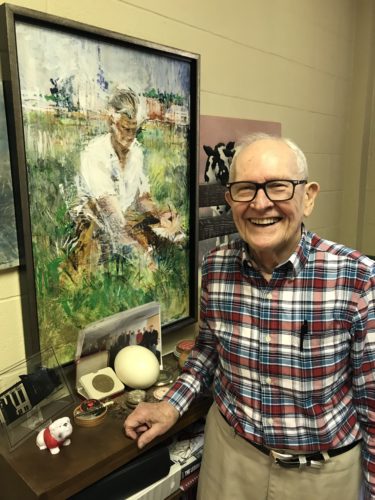Dr. William P. Flatt

When William P. Flatt became dean of UGA’s College of Agricultural and Environmental Sciences in 1981, this Tennessee native faced a declining enrollment problem. He developed an aggressive recruitment program that emphasized production agriculture as well as agribusiness and environmental health sciences. The name of the College was changed to the College of Agricultural and Environmental Sciences to reflect the emphasis on environmental programs, resulting in a rapid increase in enrollment. Dr. Flatt streamlined the chain of command at the administrative level and consolidated the business operations for teaching, research and extension. He created one of the most innovative and cutting-edge research facilities.
Tell us about how you became interested in agriculture and nutrition.
I was born in 1931 during the Great Depression, and was raised by my grandparents, on a small 5-acre farm in West Tennessee. From the time I was 6 years old, I had the opportunity to work in the cotton fields, chopping cotton, picking cotton, picking strawberries, and earning money to save to go to college. School was “let out” each year to give all of us the chance to help. In high school, I enjoyed taking vocational agriculture and was very active in the Future Farmers America (FFA). Here I learned public speaking, parliamentary procedure, leadership skills, and got the opportunity to compete with students throughout the state.
I went to the University of Tennessee in Knoxville and received a scholarship from FFA and my goal was to become a vocational agriculture teacher and FFA Advisor. However, after taking a few courses in education, I found that I liked chemistry, biology and animal nutrition better. The Head of the Department of Animal Husbandry offered me a job to participate in some research studies with cattle, and that was even more fun. When I graduated, he insisted that I get a PHD and come back to U.T. to teach Animal Nutrition. I went to Cornell University on a National Science Foundation Fellowship to study Biochemistry, Animal Physiology and Animal Nutrition. I became so interested in my research that I decided to become a research scientist instead of teaching. The USDA Agricultural Research Service in Beltsville, MD, needed someone to plan, build and supervise research on the energy requirements of dairy cows, and I was chosen to do that. I went there to build the laboratory and it was the finest one in the national. IBM had just come along and instead of having input everything manually, we could automatically record the data.
What area was your main focus?
I focused on learning all that I could about the nutritional requirements of high producing lactating dairy cows. I was provided with sufficient funds to build the lab, equip it with the most modern up to date equipment, including the capability to computerize collection and processing the data. This made it possible to conduct almost 10 times as many complete energy balance studies per year than any other laboratory in the world. I completed many studies, my favorite being the ones with my top cow, Lorna, who produced 120 lbs (15 gallons) of milk a day for several weeks in early lactation. We could measure everything she ate, drank, excreted and produced. The data has been used for decades throughout the United States and other countries to properly feed dairy cattle.
What are you most proud about your career?
The thing I am most proud of about my career at UGA was in helping to obtain the funds needed to support the research, extension and teaching programs. When I came to UGA in 1969, I was appalled at the lack of funding being provided. President Fred Davison specifically wanted UGA to become a leader in biotechnology, and Animal and Dairy Sciences was an area that needed far more state, federal, and grant support. By working with the local, state and federal leaders who could help, we were able to receive funds to make it possible for our faculty and staff to be far more productive. Our research, extension and teaching programs are now among the top 4 states in the nation in terms of publications, federal, state and private grants, and ability to better serve the citizens in our state, nation and the world.
What advice can you give to people who want to age and live well?
As you get older you start to lose muscle mass, the only way to keep this from happening and getting weaker and weaker with age is strength training. The tendency is to lose weight fast and go on a fad diet, but the likelihood of gaining the weight back within a year is very high. The key to successful aging is eating lower calories and strength training. You should be eating all the fruits and vegetables, things high in nutrients. You need to be careful amount the fat especially saturated fat you consume. Cut down the size of meat to 4 oz. As you get over the age of 65, I found that your body can no longer absorb the vitamin B12 as well as you did. I also found a similar reaction with vitamin D, if you aren’t actively outside you need to ensure you have a proper source for it. With aging, it’s important to take supplements your body is lacking in or has trouble absorbing. This list could go on and on, but enjoy every minute you can while being as active as you can each day, and you will feel “Better than Ever” for a long time.







